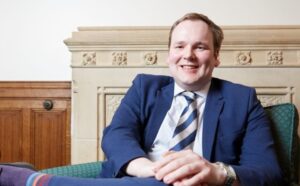News
MP Admits To Involvement In A Gay ‘Honeytrap’ Sexting Scandal
A senior Tory MP admitts his involvement in a honeytrap sexting scandal targeting a minster and MPs. William Wragg handed colleagues’ phone numbers to someone he met on a gay dating app. “They had compromising things on me. I gave them some numbers”.

British lawmakers who may have been targeted in a sexting scam were urged Friday to go to police, after a senior Conservative admitted disclosing the personal phone numbers of some colleagues to an unknown individual who held “compromising” material on him.
William Wragg, who chairs the Public Administration and Constitutional Affairs Committee in Parliament, told The Times of London newspaper that he had handed over the phone numbers to a man he met on a gay dating app, after he had sent intimate pictures of himself.
Wragg, 36, told The Times that the man had “compromising things” on him and he was “scared” and “manipulated” into giving his colleagues’ numbers to the unknown individual he had met on the gay dating app Grindr.
“I gave them some numbers, not all of them,” he said. “I got chatting to a guy on an app and we exchanged pictures. We were meant to meet up for drinks, but then didn’t. Then he started asking for numbers of people. I was worried because he had stuff on me. He gave me a WhatsApp number, which doesn’t work now. I’ve hurt people by being weak. I was scared. I’m mortified.”
Treasury minister Gareth Davies urged those affected to go to the police.
“Will Wragg has rightly apologized for the action that he took, but I think it’s clear to anybody hearing about the situation that he was in, people react in different ways,” he told Sky News.
The honeytrap sexting scam has been described as “spear phishing,” a type of cyber-attack that targets specific groups. It involves scammers pretending to be trusted senders in order to steal personal or sensitive information.
Wragg’s revelation came after days of speculation, stoked by an article published in Politico, that a number of current and former parliamentarians had been contacted by an unknown number on WhatsApp, detailing prior meetings with politicians, in efforts to acquire personal or sensitive information. The report said some of those targeted were sent naked images, with at least two reported to have responded by sending images of themselves.
“I would say to anyone watching this that if you ever feel like you’re in a compromised position, if you ever feel like you’re being blackmailed, then you should go to the police immediately because it’s an incredibly serious matter,” Davies added.
Leicestershire Police in central England has confirmed that it is investigating a report of malicious communications after a number of unsolicited messages were sent to a local lawmaker last month.
Who is Tory MP William Wragg?
As a senior member of the 1922 Committee of Tory backbenchers, William Wragg has seen many moments of political drama.
He was one of the most prominent campaigners for Boris Johnson to quit over the Downing Street parties scandal and seemed to relish the bombshell of announcing to the Commons that he had submitted a letter expressing no confidence in Liz Truss.
But now Wragg finds himself in the spotlight. Remorseful about his actions, he says he felt compelled to respond to the demands of a person he met on a gay dating app who bombarded him with requests for fellow MPs’ phone numbers. He planned to stand down anyway at the next general election, but now risks leaving parliament with a shadow over his record.
Wragg arrived in Westminster fresh-faced and in his twenties. He once said that his “misspent youth was spent getting into parliament”. A former teacher, he took the seat of Hazel Grove in Stockport in 2015.
He beat the Liberal Democrats and became the first Tory MP there since 1997.
He shunned the ministerial ladder, instead preferring the role of scrutineer. Wragg took over as chairman of the public administration and constitutional affairs committee and enjoyed delving into the world of Whitehall.
He reached a far more influential role as vice-chairman of the 1922 Committee — traditionally known as “the men in grey suits”. When a party leader needs telling their time is up, it is the 1922 Committee that does the job. Wragg was part of the collective of MPs who told a defiant Johnson that he had to go.
He also accused Tory whips of blackmail and criticised plans to shield the former MP Owen Paterson from suspension for breaking lobbying rules.
“It’s not simply the opposition who should provide scrutiny to government, it’s also the governing side who should be able to, in a very healthy way, do that,” Wragg told The Guardian last year.
“Being a backbencher is an enormously liberated thing to be, if used accordingly. And I do feel for my colleagues who become ministers.”
Now Wragg himself will come under scrutiny. A police investigation into reports of malicious communication is under way, which is likely to halt other inquiries.
But the Commons standards commissioner may decide to open his own investigation once the police matter is dealt with. Similarly, the Tory whips will have to decide whether to continue to let him sit as a Conservative MP.
When reflecting on why he decided to leave parliament at the age of 36, Wragg said he knew there was “a risk of being institutionalised”. Succumbing to the darker side of Westminster may suggest he has already left it too late.
(Additional reporting by AP, The Times)
Kenya Insights allows guest blogging, if you want to be published on Kenya’s most authoritative and accurate blog, have an expose, news TIPS, story angles, human interest stories, drop us an email on [email protected] or via Telegram
-

 Grapevine2 weeks ago
Grapevine2 weeks agoRussian Man’s Secret Sex Recordings Ignite Fury as Questions Mount Over Consent and Easy Pick-Ups in Nairobi
-

 News7 days ago
News7 days agoTHE FIRM IN THE DOCK: How Kaplan and Stratton Became the Most Scrutinised Law Firm in Kenya
-

 Investigations1 week ago
Investigations1 week agoMulti-Million Dollar Fraud: Three Kenyans Face US Extradition in Massive Cybercrime Conspiracy
-

 Economy1 week ago
Economy1 week agoIran Demands Arrest, Prosecution Of Kenya’s Cup of Joe Director Director Over Sh2.6 Billion Tea Fraud
-

 Business1 week ago
Business1 week agoA Farm in Kenya’s Rift Valley Ignites a National Reckoning With Israeli Investment
-

 Africa2 weeks ago
Africa2 weeks agoFBI Investigates Congresswoman Ilhan Omar’s Husband’s Sh3.8 Billion Businesses in Kenya, Somalia and Dubai
-

 Grapevine3 days ago
Grapevine3 days agoA UN Director Based in Nairobi Was Deep in an Intimate Friendship With Epstein — He Even Sent Her a Sex Toy
-

 Politics2 weeks ago
Politics2 weeks agoSifuna, Babu Owino Are Uhuru’s Project, Orengo Is Opportunist, Inconsequential in Kenyan Politics, Miguna Says

















